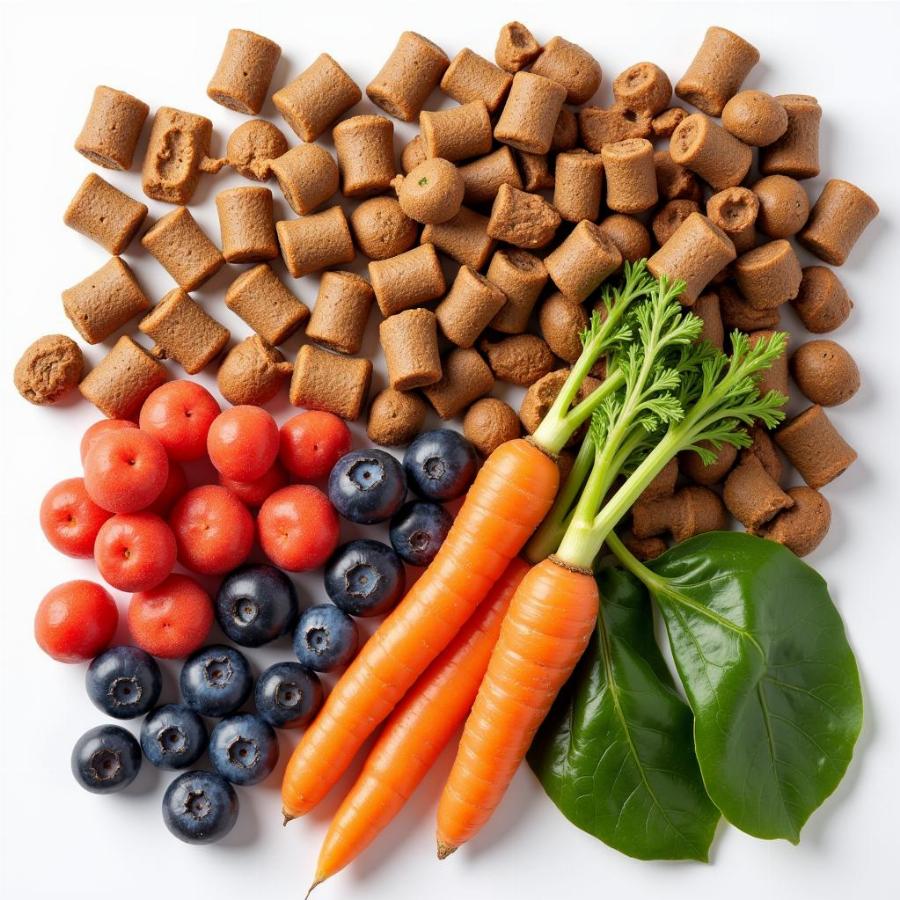Choosing the right food for your large breed dog is crucial for their overall health and well-being. “Best dog foods for large breeds” is a common search term for owners who want to ensure they’re providing their furry companions with optimal nutrition. This article will dive deep into the world of large breed dog nutrition, covering everything from essential nutrients to specific dietary needs. We’ll explore how to choose the best dog food for large breeds to support their growth, maintain a healthy weight, and prevent potential health issues.
Understanding the Nutritional Needs of Large Breed Dogs
Large breed dogs have unique nutritional requirements compared to their smaller counterparts. They need a balanced diet specifically formulated to support their larger frame, joint health, and slower metabolic rate. Key nutrients to consider include:
- Protein: Essential for muscle development and repair, but too much protein can be detrimental to kidney health in large breeds.
- Calcium and Phosphorus: Critical for strong bones and teeth, especially during growth. The ratio of these minerals is crucial for proper skeletal development.
- Glucosamine and Chondroitin: These supplements support joint health and can help prevent arthritis, a common ailment in large breed dogs.
- Fiber: Aids digestion and helps maintain a healthy weight, which is essential for reducing stress on joints.
- Antioxidants: Protect cells from damage and support the immune system.
 Thức ăn cho chó lớn
Thức ăn cho chó lớn
What to Look for in the Best Dog Foods for Large Breeds
When searching for the “best dog foods for large breeds,” keep these factors in mind:
- Breed Size: Choose a food specifically designed for large or giant breeds.
- Life Stage: Puppy, adult, or senior formulas provide tailored nutrition for different life stages.
- Ingredient Quality: Look for high-quality protein sources, whole grains, and wholesome fruits and vegetables. Avoid artificial flavors, colors, and preservatives.
- Calorie Content: Large breed puppies require more calories than adults, while senior dogs may need fewer calories to maintain a healthy weight.
- Joint Support: Look for formulas containing glucosamine and chondroitin to help protect their joints.
Common Health Concerns and Dietary Considerations for Large Breeds
Large breed dogs are prone to certain health problems, and their diet plays a significant role in preventing or managing these issues:
- Hip and Elbow Dysplasia: Genetic conditions affecting joint development. A balanced diet with proper calcium and phosphorus levels, along with glucosamine and chondroitin, can help.
- Bloat (Gastric Dilatation-Volvulus): A life-threatening condition where the stomach twists. Feeding smaller, more frequent meals and avoiding elevated food bowls can help prevent bloat.
- Obesity: Excess weight puts added stress on joints. Choose a lower-calorie food and ensure your dog gets regular exercise. best dog food large
What are the best dog foods for large breeds to prevent joint problems?
Many high-quality dog foods designed for large breeds include ingredients like glucosamine and chondroitin to promote joint health and help prevent problems like arthritis. Look for brands that specifically state joint support as a benefit.
Is it okay to feed my large breed puppy adult dog food?
No, it’s crucial to feed your large breed puppy a food specifically formulated for puppies. Puppy food contains higher levels of calcium and phosphorus for proper bone development, and the incorrect balance of these nutrients in adult food can cause skeletal problems. best dog food for english bulldog
How much should I feed my large breed dog?
Feeding guidelines are typically provided on the dog food packaging, but it’s essential to adjust the amount based on your dog’s individual needs, activity level, and age. Consult your veterinarian for personalized recommendations.
Expert Insight: Dr. Emily Carter, DVM, emphasizes, “Large breed puppies grow rapidly, and proper nutrition is crucial for their skeletal development. Feeding them a diet specifically formulated for large breed puppies is essential to prevent future health issues.”
Conclusion
Choosing the best dog food for large breeds is a significant decision that impacts their overall health and longevity. By understanding their specific nutritional needs and considering factors like breed size, life stage, and potential health concerns, you can make informed choices to provide your gentle giant with the nourishment they need to thrive. lower protein dog food
FAQ
- What is the best protein source for large breed dogs? High-quality animal protein sources like chicken, beef, lamb, and fish are excellent choices.
- Can I supplement my large breed dog’s food with additional vitamins and minerals? Consult your veterinarian before adding any supplements to your dog’s diet.
- How often should I feed my large breed dog? Most adult large breeds do well with two meals per day.
- What are the signs of food allergies in large breed dogs? Common signs include itching, skin irritation, digestive upset, and ear infections.
- What should I do if my large breed dog refuses to eat their food? Consult your veterinarian to rule out any underlying medical conditions. You may also need to experiment with different food flavors or textures. mucus in my dog's poop
Further Exploration
- Learn more about managing bloat in large breed dogs.
- Discover tips for keeping your large breed dog active and healthy.
- Explore different training techniques for large breeds. hot dog rolls
Beaut Dogs is your trusted source for comprehensive information on all aspects of dog ownership, from breed-specific care to nutritional guidance. Beaut Dogs is committed to providing valuable resources to help you give your furry friend the best possible care. When you need expert advice, contact Email: [email protected] for detailed and accurate answers from Beaut Dogs.